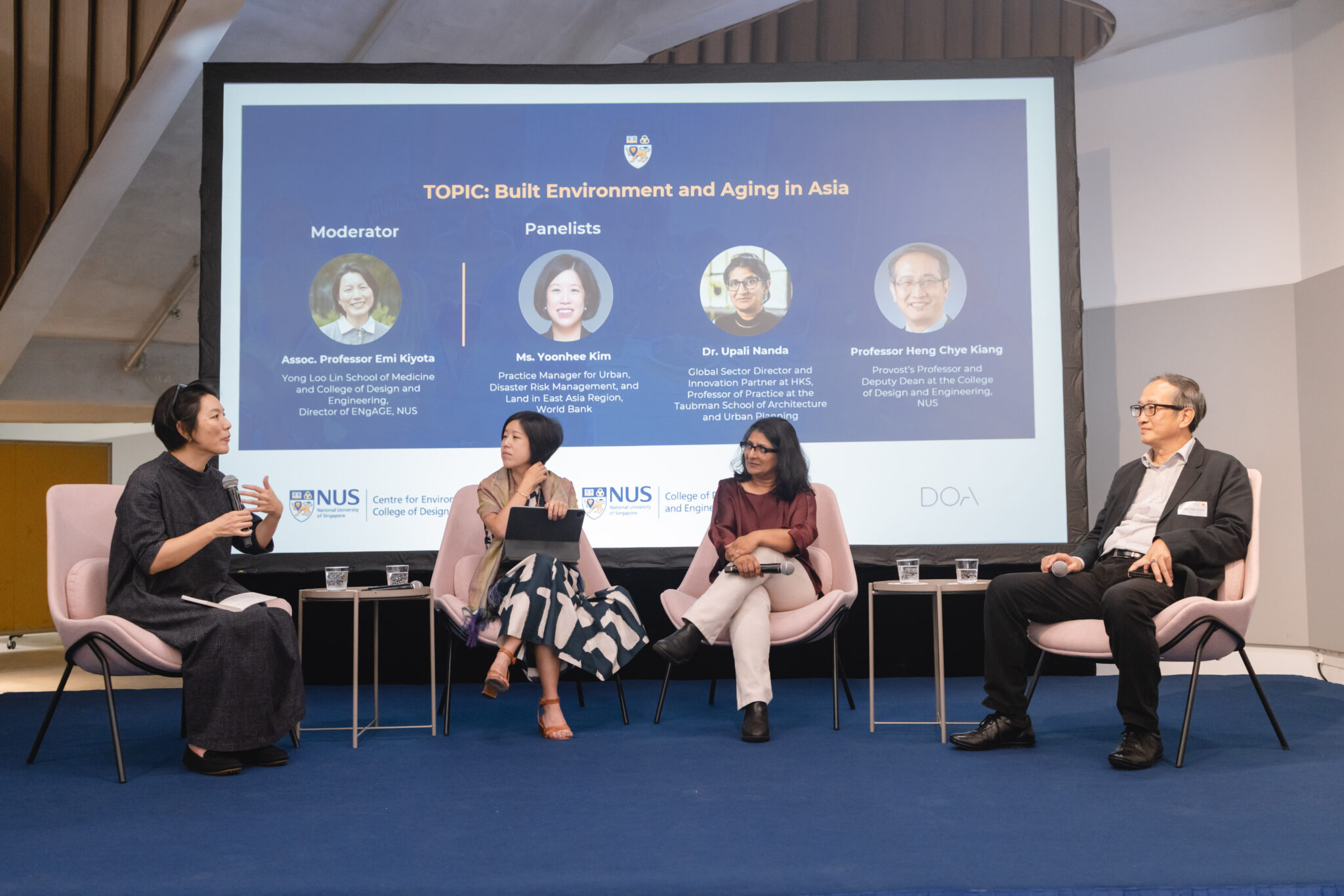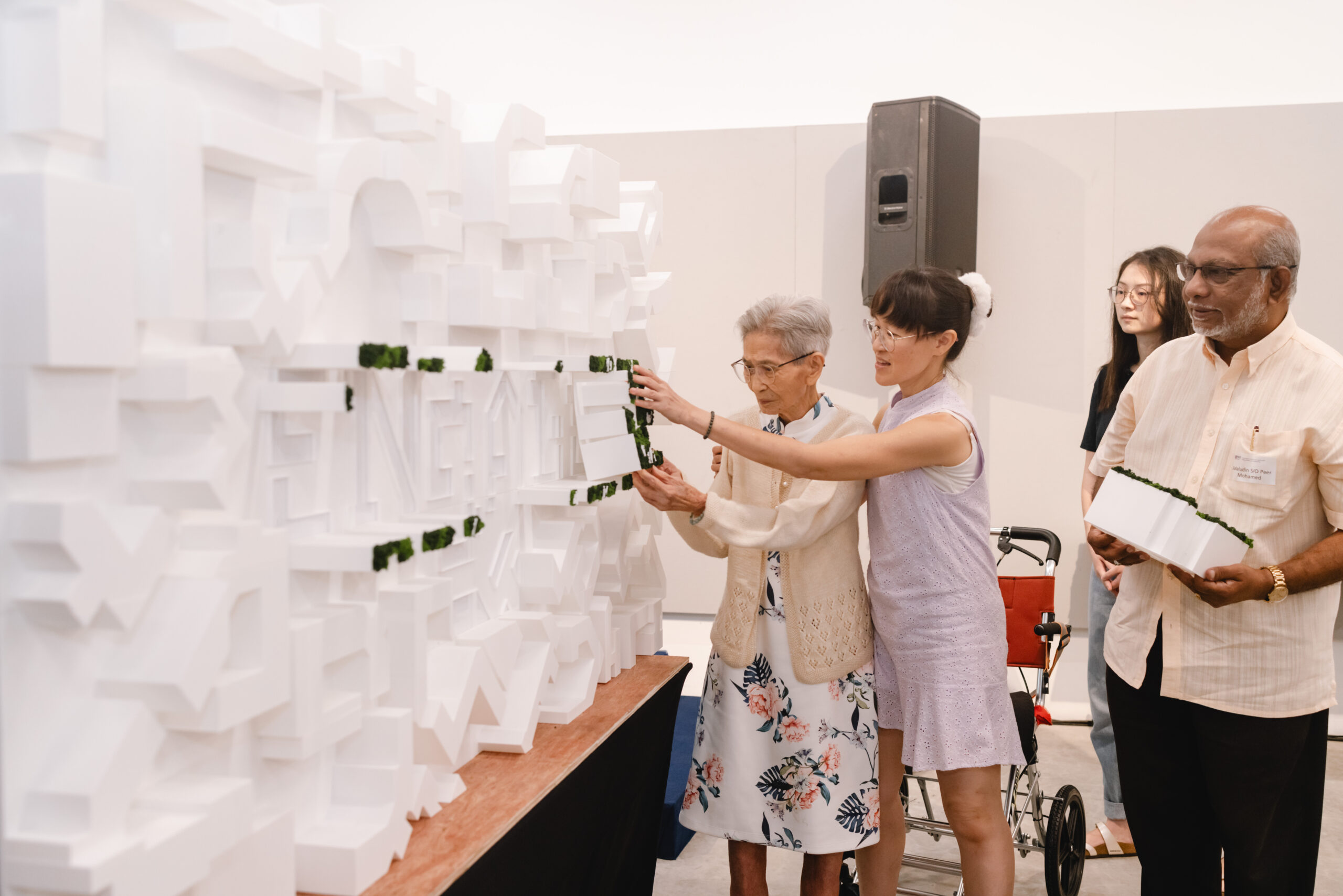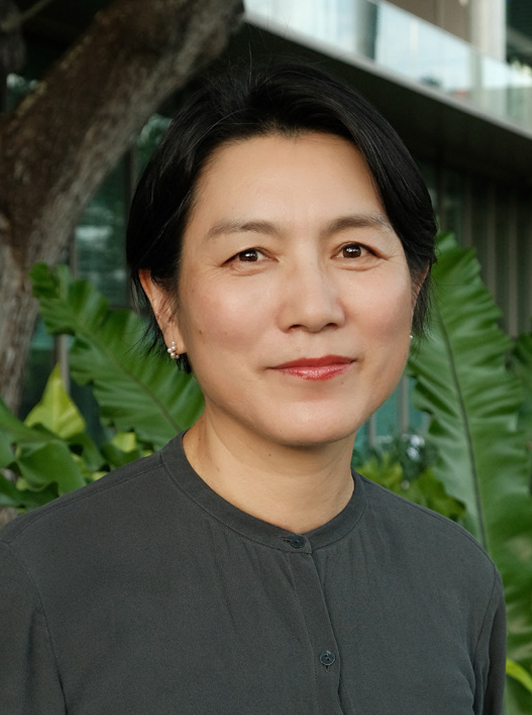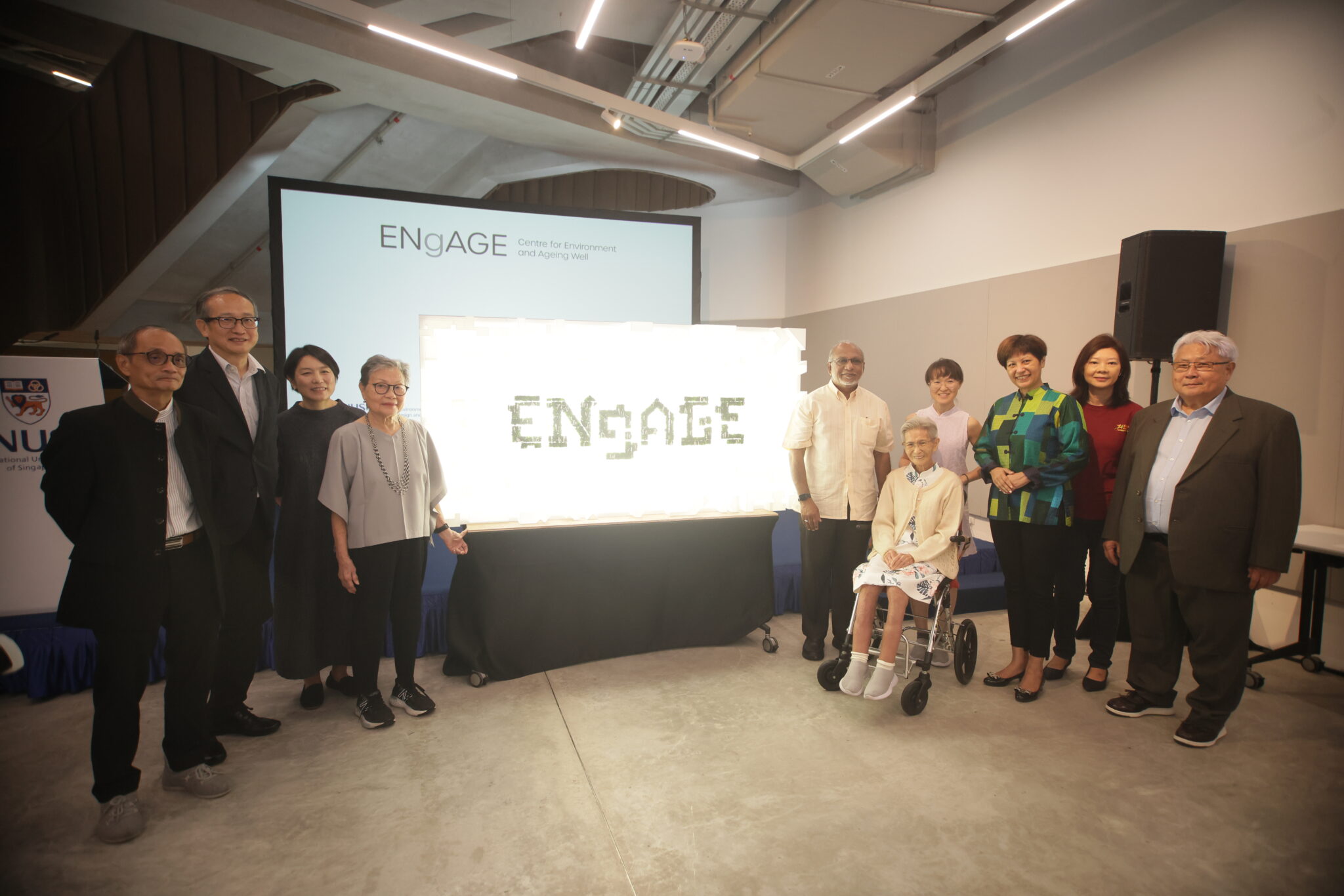Golden years bring golden opportunities
Follow CDE
PDF Download

The new Centre for Environment and Ageing Well at the College of Design and Engineering transforms how societies approach ageing-related challenges through research-driven solutions — ensuring an inclusive future in ageing.
Today, most people can expect to live to 60 years and beyond. While this might seem like an unequivocal win for humanity, the other side of the coin is that, as a result, it also imparts an unprecedented sea change in the traditional composition of our societies. Many countries are experiencing growth in both the number and proportion of older persons in the population.
A ‘demographic tipping point’ was reached in 2020 — with people aged 60 years and above outnumbering children younger than five. By 2050, the former group will constitute almost a quarter of the global population.
Population ageing — in developed and developing nations alike — is already shaking up the fundamental underpinnings of societies, economies and policymaking. It is a defining global trend of our time.
The built environment, encompassing the design and layout of cities and neighbourhoods, the construction and features of individual homes, as well as public spaces and transit systems, plays a key role in shaping the health, mobility, social interaction and overall quality of life of older persons. It can either support or impede their physical and social engagement.
Associate Professor Emi Kiyota leads ENgAGE’s ageing-related research that would improve living environments for all.
Indeed, research has shed light on person-environment engagement as a core component of health and well-being, linking it to positive health outcomes, including reduced disease risk, better mental health and improved physical and cognitive function.
The Centre for Environment and Ageing Well (ENgAGE) was launched by Ms Indranee Rajah, Minister, Prime Minister’s Office, and Second Minister for Finance and National Development (third from right). She was joined by Professor Heng Chye Kiang (second from the left); Associate Professor Emi Kiyota (third from the left); Associate Professor Fung John Chye (first from the left); Mrs Lee Li-Ming (fourth from the left), whose donation led to the establishment of ENgAGE; and community members (right).
Yet, despite the importance of supportive built environments, current research on the subject matter, though extensive, is fragmented. This has resulted in knowledge gaps that hamstrings the development of comprehensive and effective solutions to the challenges of ageing. There is, therefore, a strong imperative to carry out research into environments for healthy ageing through a methodical lens, determining how it can turn the tables for greying societies in Asia and beyond.
At the Department of Architecture, College of Design and Engineering (CDE), National University of Singapore (NUS), Associate Professor Emi Kiyota is spearheading ageing-related research at the Centre for Environment and Ageing Well (ENgAGE). This centre is dedicated to advancing knowledge and practices essential for the well-being of all age groups, with Assoc Prof Kiyota as its Director along with Associate Professor Fung John Chye as Co-Director.
ENgAGE expands on the research carried out by its predecessor, the Centre for Ageing Research in the Environment (CARE), previously headed by Assoc Prof Fung.
“Rather than just conducting research to figure out what older persons need, we must engage in meaningful conversations with them. How can we shift the narrative so that those offering help, including the younger generation, understand that in helping others, they are also helping themselves?” Assoc Prof Fung poses. “After all, ageing is a process that spares no one. At the same time, we need to adopt scientific methods to ensure the robustness and applicability of our research findings to impact policies and improve the human condition.”
ENgAGE leads the way
Bolstered by a multi-disciplinary founding team with decades of experience in ageing-related research, ENgAGE is equipped with a unique lens and capabilities to tackle the challenges facing ageing populations effectively.
“We aim to transform how societies approach ageing-related challenges by becoming a leading research hub for ageing and the environment, pioneering solutions to ensure an inclusive future for older persons,” says Assoc Prof Kiyota. “The Centre will coordinate and consolidate place-based, ageing-related research, education and resources within the NUS community, leading capacity-building initiatives and fostering collaboration among diverse stakeholders — all united by a shared interest in improving living environments for everyone.”

The panellists had a fruitful discussion on the challenges and opportunities on ageing in Asia. From left to right: Associate Professor Emi Kiyota, Ms Yoonhee Kim, Dr Upali Nanda and Professor Heng Chye Kiang.
“The launch of ENgAGE represents a pivotal step in our commitment to improving quality of life and well-being for all. By deepening our understanding of how ageing impacts communities across Asia, ENgAGE will lead the way in creating environments that promote health, independence and dignity throughout all stages of life,” adds Professor Heng Chye Kiang, Deputy Dean of NUS CDE.
"We need to rethink how we design spaces for older persons. Too often, spaces are built for them, yet they don’t want to use them due to the stigma attached to ageing. Why do we keep building places they avoid?"
"We need to rethink how we design spaces for older persons. Too often, spaces are built for them, yet they don’t want to use them due to the stigma attached to ageing. Why do we keep building places they avoid?"
Research at ENgAGE focuses on the intersection between ageing and the built environment, conducting extensive studies and formulating practical solutions. In particular, the Centre’s research is organised under three pillars: Ageing-in-Place in Asia, Design for Brain Health, and Climate Change and Ageing in Asia.
The first research pillar, Ageing-in-Place in Asia, addresses key factors — from health burdens to loneliness and social isolation — that make ageing-in-place a viable option for more older adults. “We need to rethink how we design spaces for older persons. Too often, spaces are built for them, yet they don’t want to use them due to the stigma attached to ageing. Why do we keep building places they avoid?” says Assoc Prof Kiyota, underscoring the need for environments that foster natural interactions across generations. “Ageing-in-place should be different from ageing-in-space, like in a nursing home, for example.”
"We need to rethink how we design spaces for older persons. Too often, spaces are built for them, yet they don’t want to use them due to the stigma attached to ageing. Why do we keep building places they avoid?"
The environment we live and work in also shapes our health as we age. While we cannot yet compose our genome, we can design our environment to support ageing. The second research domain, Design for Brain Health, focuses on how the design of environments influences our cognitive health as we age, with the goal of developing innovative strategies that promote brain health in ageing populations. This is a pressing need given the rise in dementia cases, particularly in developing countries across Asia. In Singapore, approximately one in 10 people aged 60 and above is diagnosed with the condition, with numbers expected to double by 2030.
“We need to create comfortable spaces for people with dementia, which is not just about preventing them from getting lost but enabling them to wander safely — whether through car-lite environments or wearables that guide them home,” adds Prof Heng. “We must tackle the fundamental issues first.”
Climate change presents severe health risks to older persons in Asia, who are particularly vulnerable to extreme weather events and environmental stressors. These risks are compounded by socio-economic factors, as lower-income countries may lack the resources to consider future climate impacts on ageing communities. The Climate Change and Ageing in Asia research pillar addresses these challenges by developing resilient and sustainable living environments tailored to the needs of these populations. Key strategies include reducing the contribution of older persons to climate change; protecting them from its impacts; and harnessing their potential in climate action.
Interdisciplinary, collaborative research
Driven by the three research pillars, ENgAGE has embarked on three projects, one of which focuses on the co-development of integrated senior housing typologies. This project aims to fill critical gaps in understanding how the built environment influences the well-being of older persons — essential in creating practical, user-centric housing designs. The project will also establish a baseline for a longitudinal study on housing typologies, providing a scalable model that balances cost, comfort and care for ageing-in-place strategies.
The second project, Alexandra Hospital Tentacles, seeks to address the challenges of limited walkability and mobility options in the ageing Mei Ling/Stirling neighbourhood. The research will carve out primary and secondary pedestrian routes, known as ‘tentacles’, and propose nodes for community healthcare facilities — all of which foster greater connectivity and access to essential services within the community.

Community members Mdm Yeo, Ms Tan and Mr Peer Mohamed were invited to take part in the launch ceremony. They are actively involved in ENgAGE’s projects.
Examining the correlation between ageism, the built environment and mental well-being in diverse cultural contexts is also on ENgAGE’s research radar. Employing a systems approach, this project aims to reveal implicit ageist biases in urban planning and architectural design and their impact on age-friendly infrastructure. Pinpointing and alleviating such biases could lead to more inclusive urban policies and practices that support and respect the needs of all age groups.
Building environments for healthy ageing
The shift towards ageing populations is largely irreversible — but enabling the aged enables our future selves. Collective actions and policy decisions will shape its path and consequences. The ways in which policymakers broach the topic, with foresight and planning, will directly impact how various building blocks of society — from workforce structure to healthcare infrastructure to co-living spaces — function and complement one another to bring the world closer to an age-inclusive future.
“That future should begin today, and ENgAGE aspires to be a thought leader in shaping it. Each of us has a part to play — researchers, policymakers, practitioners, industry partners and community members alike. By reshaping the language we use and the spaces we design, we can change perceptions of ageing. Just as language and our behaviour reflect who we are, the environments we create should inspire older persons to feel proud and engaged in their communities,” Assoc Prof Kiyota concludes.
Assoc Prof Fung adds, “We would need an open mind and sandbox culture to be constantly self-critical of our assumptions and be bold in envisioning new imaginations.”
Read More
View Our Publications ▏Back to Forging New Frontiers - October 2024 Issue
If you are interested to connect with us, email us at cdenews@nus.edu.sg










